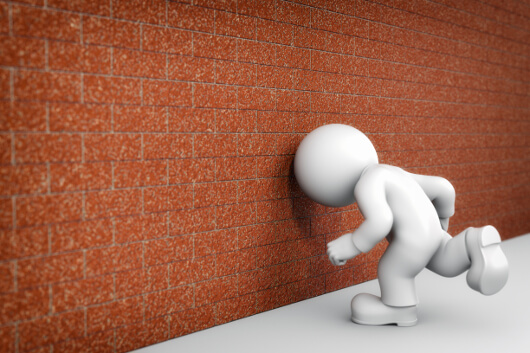Why Do You Punish Yourself?

Self-punishment is pointless. It’s irrational anger with oneself, a manner of treating oneself with contempt each time you feel embarrassment or a lack of control, or each time you feel failed or rejected by someone else. It’s useless and unhealthy.
Self-punishment involves self-harm, insulting oneself, isolating oneself, and feeling unworthy of other people. But this doesn’t fix anything.
Maybe you know that, but even so, you don’t know how to stop punishing yourself, how to escape the destructive cycle of self-attack and direct yourself to a pattern of constructive behavior.

Why is it so difficult to stop punishing yourself?
Self-punishment is so persistent because it’s a defense against the pain of life. And life is full of pain.
We all have a strong need to connect with others, to be accepted, to achieve success and approval. But we’re faced with the reality that, sometimes, other people reject us, deceive us, and put their own needs before ours. The people we love suffer and die, and our dreams don’t always become reality.
When we feel this pain, we gather up a lot of energy because we are prepared to do something about it. This energy can be experienced internally in the form of anger or rage. This motivates us to find inner peace and overcome the pain; it drives us to leave and come back to do whatever we want or need to do.
However, when we are knocked down, ignored, unappreciated, or attacked over and over again for trying to satisfy our needs, the need to self-punish can appear. The same can happen if we neglect the search for peace as a way to overcome the pain.
This causes the person to feel insecure or useless, and they take that anger and rage and turn it against themselves. In that moment, they start to think that they are the cause of the problem. The guilt makes them feel the need to punish themselves.

Why is self-punishment useless?
Sometime we attack ourselves thinking that the pain will solve the problem. But these punishments don’t solve anything, they just leave you dejected and isolated. You get so used to attacking yourself, that you start to feel like it’s a permanent part of who you are.
This anger at yourself can consume you and distract you from being present and involved in your life. Your relationships, your connections with yourself and others, will keep affirming the need to punish yourself in a continuous cycle that gets more and more difficult to stop.
How can you free yourself from self-punishment?
To begin, you have to recognize that self-punishment can be deeply ingrained in your behavior. In fact, you may feel the need to punish yourself even more when you discover how deeply it has penetrated your pain. But this shouldn’t stop you. You have to be honest with yourself, let everything flow.
You should focus beyond just self-esteem. If you were capable of finding self-love and acceptance, you wouldn’t have gotten to this point, but you have to start somewhere. Creating positive feelings about yourself is very important to improve your well-being.
More than just the need to punish yourself, you need to get help to take away your pain. You need a way to channel your anger. If you can’t do it alone, find someone who will support and guide you.
You also need to experience the comforting sensation of calmness, as a first step to learn how to relax when you feel the need to turn your anger against yourself.

Finally, it’s important that you learn to feel compassion for other people’s pain and to value human needs. Only then will you be able to feel compassion for yourself and value yourself.
In time, we’ll find that we have the capacity for recovery, to manage the pain of life, and to identify and pursue what we want and need. Courageously, we’ll free ourselves from self-punishment and direct our energy out to the world.
Self-punishment is pointless. It’s irrational anger with oneself, a manner of treating oneself with contempt each time you feel embarrassment or a lack of control, or each time you feel failed or rejected by someone else. It’s useless and unhealthy.
Self-punishment involves self-harm, insulting oneself, isolating oneself, and feeling unworthy of other people. But this doesn’t fix anything.
Maybe you know that, but even so, you don’t know how to stop punishing yourself, how to escape the destructive cycle of self-attack and direct yourself to a pattern of constructive behavior.

Why is it so difficult to stop punishing yourself?
Self-punishment is so persistent because it’s a defense against the pain of life. And life is full of pain.
We all have a strong need to connect with others, to be accepted, to achieve success and approval. But we’re faced with the reality that, sometimes, other people reject us, deceive us, and put their own needs before ours. The people we love suffer and die, and our dreams don’t always become reality.
When we feel this pain, we gather up a lot of energy because we are prepared to do something about it. This energy can be experienced internally in the form of anger or rage. This motivates us to find inner peace and overcome the pain; it drives us to leave and come back to do whatever we want or need to do.
However, when we are knocked down, ignored, unappreciated, or attacked over and over again for trying to satisfy our needs, the need to self-punish can appear. The same can happen if we neglect the search for peace as a way to overcome the pain.
This causes the person to feel insecure or useless, and they take that anger and rage and turn it against themselves. In that moment, they start to think that they are the cause of the problem. The guilt makes them feel the need to punish themselves.

Why is self-punishment useless?
Sometime we attack ourselves thinking that the pain will solve the problem. But these punishments don’t solve anything, they just leave you dejected and isolated. You get so used to attacking yourself, that you start to feel like it’s a permanent part of who you are.
This anger at yourself can consume you and distract you from being present and involved in your life. Your relationships, your connections with yourself and others, will keep affirming the need to punish yourself in a continuous cycle that gets more and more difficult to stop.
How can you free yourself from self-punishment?
To begin, you have to recognize that self-punishment can be deeply ingrained in your behavior. In fact, you may feel the need to punish yourself even more when you discover how deeply it has penetrated your pain. But this shouldn’t stop you. You have to be honest with yourself, let everything flow.
You should focus beyond just self-esteem. If you were capable of finding self-love and acceptance, you wouldn’t have gotten to this point, but you have to start somewhere. Creating positive feelings about yourself is very important to improve your well-being.
More than just the need to punish yourself, you need to get help to take away your pain. You need a way to channel your anger. If you can’t do it alone, find someone who will support and guide you.
You also need to experience the comforting sensation of calmness, as a first step to learn how to relax when you feel the need to turn your anger against yourself.

Finally, it’s important that you learn to feel compassion for other people’s pain and to value human needs. Only then will you be able to feel compassion for yourself and value yourself.
In time, we’ll find that we have the capacity for recovery, to manage the pain of life, and to identify and pursue what we want and need. Courageously, we’ll free ourselves from self-punishment and direct our energy out to the world.
This text is provided for informational purposes only and does not replace consultation with a professional. If in doubt, consult your specialist.







